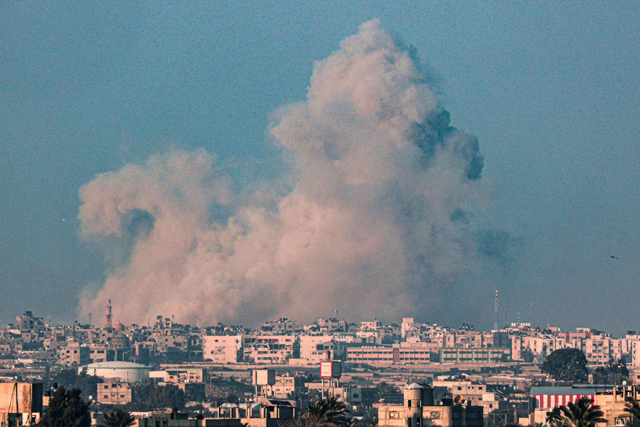GAZA STRIP, Palestinian Territories — Israel's prime minister said on Sunday a potential ceasefire in its war against Hamas fighters would only delay a ground invasion of Gaza's southern city Rafah that has sheltered more than half of the conflict-battered territory's population.
The United States said ongoing mediation efforts produced "an understanding" towards a ceasefire and hostage release, while dire food shortages in northern Gaza have sent Palestinians fleeing.
Egyptian, Qatari and US experts met in Doha for talks also attended by Israeli and Hamas representatives, state-linked Egyptian media said, in the latest effort to secure a truce before the Muslim holy month of Ramadan.
Prime minister Benjamin Netanyahu said that the military operation into Rafah, on Gaza's southern border with Egypt, would put Israel within weeks of "total victory" over Hamas whose October 7 sudden attack triggered the war.
"If we have a deal, it will be delayed somewhat, but it will happen," he told CBS of the looming ground invasion feared to bring more mass civilian casualties in Rafah, where around 1.4 million Palestinians, most of them displaced from other areas, have converged.
"If we don't have a deal, we'll do it anyway," Netanyahu said.
"It has to be done because total victory is our goal and total victory is within reach — not months away, weeks away, once we begin the operation."
The Doha talks follow a weekend meeting in Paris, without Gaza rulers Hamas, where representatives "came to an understanding among the four of them about what the basic contours of a hostage deal for temporary ceasefire would look like", White House National Security Adviser Jake Sullivan told CNN.
More than four months into the war, desperate families in the north of the besieged Gaza Strip have been forced to scavenge for food as fighting and looting have stopped humanitarian deliveries.
Hundreds headed south whichever way they could, walking down garbage-strewn roads between the blackened shells of bombed-out buildings, said an AFP correspondent.
“I came on foot from north Gaza,” said Samir Abd Rabbo, 27, who arrived with his one-year-old daughter at the Nuseirat camp in central Gaza.
Without milk, he said, he had tried to feed his baby girl bread made from animal feed, which she was unable to digest. “Our only hope is God, there is nobody else to help.”
In northern Gaza’s Jabalia, displaced man Marwan Awadieh said the area “has become completely uninhabitable” and food was desperately scarce.
“Even the animal fodder that we had resorted to is now unavailable,” he said, and wild herbs have “now been depleted, people have gathered it all”.
Israeli forces continued striking targets across the Palestinian territory and battling Hamas militants in heavy urban combat centred on the southern city of Khan Yunis, near Rafah.
The war broke out after Hamas’s unprecedented surprise attack on Israel on October 7.
Hamas fighters also took about 250 Israeli and foreign hostages, 130 of whom remain in Gaza, including 31 presumed dead, according to Israel.
Israel’s retaliatory offensive has killed at least 29,692 people, mostly women and children, according to the latest tally issued Sunday by the health ministry in Gaza.
Talks have been held for weeks with the goal of reaching a temporary truce, to exchange Hamas’s hostages for Palestinian prisoners held in Israeli jails, and to step up aid deliveries.
Mediators have voiced hope a deal can be reached before the start of Ramadan on March 10 or 11, depending on the lunar calendar.
Israeli warnings of a Rafah ground invasion have sparked deep concern and questions about where the Palestinians who have sought refuge there, many in makeshift camps, would flee to in the devastated territory.
Neighbouring Egypt has kept its border closed to a mass refugee flight, arguing it will not help facilitate any Israeli operation to push Palestinians out of Gaza.
Inside Israel, public pressure has grown on Netanyahu — both from the desperate families of hostages demanding swifter action, and from a resurgent anti-government protest movement.
Gaza’s humanitarian crisis has spiralled, with the UN World Food Programme reporting “unprecedented levels of desperation”.
Red Crescent volunteer Ezzedin Halaweh said food shortages in the north were “leading to severe health issues, especially among children”.
A Hamas official in northern Gaza told AFP that “killing our people by starvation... is a crime of genocide that threatens the entire process of negotiations”.
